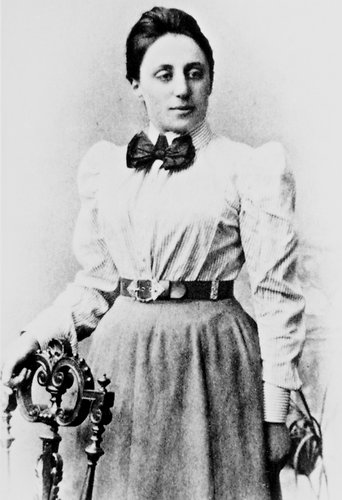Winner of the Spring 2019 StMU History Media Award for
Best Overall Research
In patriarchal societies, men limit the aspirations that women have, from how women are allowed to express themselves, to how women are allowed to pursue their livelihoods. One woman who faced these limits was the German-Jewish woman Emmy Noether. Noether’s passion was mathematics. She loved the world of mathematics, and she sought to make mathematics her career, at a time and place where women were largely excluded from such ambitions. German universities at the turn of the twentieth century were bastions of elite academic males. So how did this woman overcome those obstacles to her aspirations and succeed in becoming one of the most renown female mathematician of her age? Ironically, it all started with a man: her father.
Emmy Noether fell in love with mathematics because her father, Max Noether, was a mathematics professor at the University at Erlangen in Germany, where Emmy later started her own undergraduate studies.1 Max Noether’s research in algebraic-geometry studies ignited Emmy Noether’s passion for mathematics, and was the catalyst for her decision to go to college to study mathematics. And there, at her father’s university, she began her undergraduate studies in the year 1900.

In the early decades of the 1900’s, including the field of mathematics, it was rare for women to become students or faculty in Germany’s educational institutions.2 But Emmy gained acceptance to study mathematics, and after two years of her studies as an unclassified student, she excelled in the examination that allowed her to start her doctoral work as a matriculated student.3 Noether had also begun giving lectures and teaching with her father at the University of Erlangen, as an unofficial professor without pay and under the name of other official professors. For the next thirty years, her career consisted of pursuing research under her father’s wing and continuing on as a teaching assistant, being one of the few women in the department.
In 1930, Noether moved her research to Göttingen University, where she focused on commutative number fields, non commutative algebra, and linear transformations with Professor Helmut Hasse. As her research continued to expand, Emmy converted “algebraic number fields into theorems for ideals in arbitrary integral domains (and rings in general)” where the “ideals in rings” was introduced.4 Due to the new discoveries that were made, new ideals on elimination and algebraic varieties theories also took a new step for history.
One of her many well-known accomplishments in the mathematics field is the Brauer-Hasse-Noether Theorem, where she worked with fellow mathematicians Kurt Hensel and Richard Brauer in quantitative research. Their main idea of work in Cyclic Algebra was known as the “Proof of a Main Theorem in the theory of algebras,” and in November of 1931, their proof added its last addition of work.5 In Emmy’s contribution to the Theorem with Hasse and Brauer, she submitted what is known as “Emmy’s Method,” which is the reduction method that affected the collective theorem of cyclicity.

“Als Eingangsdatum erschien in der publizierten Arbeit der Tag, an dem das Manuskript bei Emmy Noether eingetroffen war.” This translates to “The date of publication in the published work was the day on which the manuscript was entered by Emmy Noether.”6 The quote is from the documented historical letter, “Anmerkungen zum Dokument vom 6.10.1927,” from Hasse and Noether in most of their timeline of research. Emmy Noether had a contribution of letters that were submitted for the Annals of Mathematics, yet she had been classified as an unofficial writer for the document itself.
Although her earlier contributions were not recognized or acknowledged, Noether’s work over the years all contributed to Emmy Noether being the first woman and the tenth honoree to ever receive the Ackermann-Teubner Award. This esteemed award, which she received in 1932, had been created as a way to recognize the analysis of mathematics and scientific work through research and published papers.7 Emmy Noether had received recognition as a history-making woman mathematician, and receipt of this award gave more acknowledgement to her algebraic theorem contributions to the world of mathematics. Events such as these allowed the awareness of her work to expand beyond the university, and her limitations as a woman mathematician began to decrease. Yet that was just about to change in 1932, as the Nazi Party in Germany climbed ever higher in each of the four elections that were held that year. Her position as a woman academic in a Nazi-controlled Germany started receiving negative attention. And the Nazis took the lead in harassing not only women academics, but especially Jewish women academics.
In January 1933, Adolf Hitler became German Chancellor and the Nazi Party then gained power throughout Germany. Educational institutions throughout Germany were affected by the changes of this new Germany, including the discipline of mathematics, where “the treatment of mathematicians of ‘unfavorable ethnicity’ like Jews” was now receiving increased scrutiny.8 This affected mathematicians at the University at Göttingen, where Emmy Noether faced increasing harassment for not only being a woman mathematics professor, but especially for being a Jewish professor teaching “Aryan” students. Even before the Nazi seizure of power, students, faculty, and staff in universities throughout Germany had been subjecting Jewish professors to a wide range of disrespectful behaviors. But now that the Nazis were completely in power, the disrespect escalated to outright harassment of Jewish students and Jewish professors, no matter who they were.9

The harassment of Jewish academics was followed up with new laws affecting all schools throughout Germany. Jews were forbidden to work at or attend schools meant for Aryan students. As a consequence of these actions and laws, many Jewish professors left their universities, left Germany, and immigrated, many of them making their way to the United States. This was especially true for Jewish mathematicians. Emmy Noether was one of dozens of professors forced to leave her career and leave her research in April of 1933.10
As this happened, Jewish academics “managed to keep contacts with Jewish mathematicians who were forced to immigrate” through journals.8 These journals retained possession of records and information on the people that had been enforced due to the Anti-Semitism Movement. In time, the Law of Restoration in 1933 established the dismissal of all Jews from Academic contributions and activity. Slowly the participation of Jewish scholars in Germany society began to decrease. The Nazi regime restricted employment opportunities for Jews and significant limited the freedom and rights of Jewish people for the foreseeable future.

Noether lived through these early months of the Nazi regime. She faced discrimination during and after her dismissal from her university work in April 1933. Months later, Noether had the option to go to Moscow with some of her fellow Jewish friends, but decided to immigrate to the United States, where she was offered a position to teach mathematics at Bryn Mawr College in Pennsylvania.12 In her new environment, Emmy Noether not only lectured her own classes and continued her algebraic research, but she taught and worked with other women for the first time. For three years after her arrival in the United States, she made many friends and continued to write letters to her brother Fritz Noether and her former colleague Helmut Hasse, from Göttingen, until her sudden death in 1935 from illness.
At her funeral at Bryn Mawr, she was finally acknowledged for her scholarly work in the Mathematical Annal by Hermann Weyl, and she was remembered for her dedication to her theorem discoveries with various professors, including Hasse and Brauer. Even before her time at Bryn Mawr, Noether knew that her “methods are working, conceptual methods and therefore have anonymously penetrated everywhere,” even in the early stages of her successful research.6
During times of trial, acceptance, denial, and discrimination of different kinds, like millions of women throughout history, Emmy Noether lived decades of her life fighting and beating discrimination for her being a woman. Women like her had long been limited in how they could be involved in politics and family planning. And in Emmy Noether’s case, these women were limited in their education opportunities. Specifically, by living in Germany and being born as a woman, education and employment opportunities were very limited, yet Emmy Noether spent her life defeating the odds by becoming a renowned woman mathematician, who went to college, received her doctorate degree, and completed and published research in a male dominated culture. Noether survived the discrimination of the Nazi regime and made history as a woman mathematician. Noether’s mathematical theorems are foundational to what students are taught in today’s classrooms because of her dedication and determination to be in the field of mathematics. She has left a lasting contribution to the mathematical theories that we still use today.
- Jose Ignacio Cogolludo-Augustin and Miguel A. Marco Buzunariz. “The Max Noether Fundamental Theorem is Combinational,” University of Zaragoza (February 2010): 1, https://www.researchgate.net/publication/45900664_The_Max_Noether_Fundamental_Theorem_is_Combinatorial. ↵
- Peter Roquette and Franz Lemmermeyer, Helmut Hasse Und Emmy Noether, Die Korrespondenz 1925 – 1935 (Universitätsverlag Göttingen, 2006), 34, http://www.oapen.org/search?identifier=610183. ↵
- Alice Silverberg and Dirk Huylebrouck. “Emmy Noether in Erlangen,” Mathematical Intelligencer 23, no. 3 (Summer 2001): 23, https://www.researchgate.net/publication/226231187_Emmy_Neother_in_Erlangen. ↵
- Emmy Noether, Ideal Theory in Rings (Idealtheorie in Ringbereichen), (University at Erlangen, October 1920), https://arxiv.org/abs/1401.2577. ↵
- Peter Roquette et al., Helmut Hasse und Emmy Noether, Die Korrespondenz 1925 – 1935 (Universitätsverlag Göttingen, 2006), 34. http://www.oapen.org/search?identifier=610183 ↵
- Peter Roquette and Franz Lemmermeyer, Helmut Hasse Und Emmy Noether, Die Korrespondenz 1925 – 1935 (Universitätsverlag Göttingen, 2006), http://www.oapen.org/search?identifier=610183. ↵
- A Biographical Encyclopedia, 2002 s.v. “Noether, Emmy (1882–1935),” by Hugh A. Stewart. ↵
- Stana Remus, “Mathematics in Nazi Germany,” (University of Glasgow, 2009): 1, 5, https://www.gla.ac.uk/media/media_338601_en.pdf. ↵
- Stana Remus, “Mathematics in Nazi Germany,” (University of Glasgow, 2009): 1, https://www.gla.ac.uk/media/media_338601_en.pdf. ↵
- Stana Remus, “Mathematics in Nazi Germany,” (University of Glasgow, 2009): 1, 5, https://www.gla.ac.uk/media/media_338601_en.pdf. Stana Remus states: “In total 145 mathematicians in academic positions were forced to leave Germany and this list includes Emmy Noether, Richard Courant and Hermann Weyl. Their main destination was the United States of America, where 82 of the 145 went, leading to America becoming the world centre of mathematics.” ↵
- Stana Remus, “Mathematics in Nazi Germany,” (University of Glasgow, 2009): 1, 5, https://www.gla.ac.uk/media/media_338601_en.pdf. ↵
- A Biographical Encyclopedia: Women in World History, 2002 s.v. “Noether, Emmy (1882–1935), by Hugh A. Stewart. ↵
- Peter Roquette and Franz Lemmermeyer, Helmut Hasse Und Emmy Noether, Die Korrespondenz 1925 – 1935 (Universitätsverlag Göttingen, 2006), http://www.oapen.org/search?identifier=610183. ↵



66 comments
Hoa Vo
Emmy Noether was not only a strong woman but also a true survivor. She spent her whole life fighting for herself against discrimination for being a woman and a Jewish. Also thanks to her dad who was her inspiration, he supported her daughter for most of her career catalyzed her passion, and shaped who she was. In the end, She achieved what she deserved, and her works contributed a lot to mathematics. Thank you for providing this article about this respectful woman.
Maria Luevano
Emmy Noether contributed so much and had a great passion for mathematics. I loved learning about her and how she was able to overcome obstacles during such a difficult time, especially because she was a woman. I am glad she didn’t hide behind the men in her society and was able to succeed and could live up to her passion without limiting herself.
Dhwani Chandi
As a woman myself, It feels very delightful and proud to read some good articles like this. It was very ironic and intriguing at the same time to know that Emmy Norther fell in love with math because of her father. The part in the article where the nazi party came and gained power was distressful because that’s where Emmy Noether faced harassment for being a woman mathematics professor and also being a Jewish professor teaching in the university.
In the last paragraph, it is obvious that she was a strong and confident woman always looking for answers in math, and in the end contributing to the society of math.
Eliza Merrion
As a women in stem and more specifically mathematics, this article caught my eye. It is always empowering to read about inspiration females in science or math, which are fields usually dominated by men. Emmy Noether’s story and her contribution to math, the collective theorem of cyclicity, is extremely fascinating. It was inspiring to read how she dealt with the harassment of being a woman in mathematics and a jewish professor. I really enjoyed this article and I felt the detail of her story was very well written, and one more people should hear about.
Karla Fabian
This article reflects women’s empowerment in fields where men usually predominate. It is very interesting to comprehend that Emmy Noether fell in love with mathematics due to her dad, who was a mathematics professor, where Emmy started her undergraduate studies. Also, it is very intriguing to know that, even though some of her work was not acknowledged, Emmy still achieved the Ackermann-Teubner Award, and was the first woman to do so. This reflects Emmy’s dedication and bravery to work in this field, considering society’s view of women, especially those working in this field. The way the article is constructed is very detailed, as it lets the reader comprehend and understand Emmy’s decisions and determination to achieve all her potential in that field.
Aneesa Zubair
It’s always so interesting to read about female researchers in science, mathematics, etc., because many of them weren’t credited for their work in the past, and their stories are only being told now. I’ve never heard of Emmy Noether before, but her story is incredible. She made important discoveries and taught students at the University of Erlangen (without even being paid for her work), all in the midst of Nazi control over Germany. I was glad to read that she later went on to teach at Bryn Mawr after facing so many obstacles (though she probably continued to deal with discrimination her whole life). Noether’s story is extremely important, and you did a great job of telling that story!
Savannah Palmer
I admire the way in which this article expands on the life of Emmy Noether. Noether’s love for mathematics enables her to overcome the obstacles of discrimination. Her determination, drive and perseverance through discrimination reveals her strong and empowering nature. It was so interesting that portions of the articles were written in German. It allows for the reader to understand Noether’s German Environment. Overall, this well-written article brought to life the immense dedication and love that Emmy Noether had for mathematics.
Jacob Silva
I think this article is very well written and informative and highlights the struggle many women face based on gender that some people think was a long time ago when in reality it really wasn’t. Despite having the odds against her, Emmy Noether persevered through this gender inequality and was able to be quite successful in what she wanted to do.
Kimberly Parker
It is so interesting to find out that a woman contributed so much in mathematics, and even more so finding out that her father was the person that pushed her into becoming a mathematician, considering the view’s society had on women in the field of mathematics at the time. She was so dedicated to her work, and she should be recognized and talked about more often.
Bruno Lezama
I find this article interesting to read. It is the first time that a hard about Emmy Noether. I believe that she made history fighting against patriarchal societies. All that she did was thanks to the passion that she had for mathematics. The dream of Emmy Noether was becoming a recognize mathematician; however, she has to deal with discrimination and more problems that women had at that time. I think that Emmy is an example of how people can do whatever they want of they have the passion.